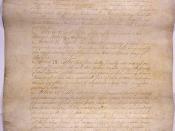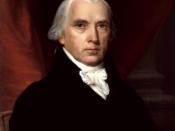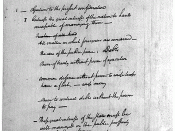Confederation to the Constitution
Did the ideologies that inspired and explained the revolution adapt to the need of constructing a political order while retaining coherence, consistency and integrity or did the framers of the Constitution disguise their political reorientation by substituting metaphoric revenance for realistic fidelity? When the Constitution was submitted to states for ratification, there was significant uncertainty that it would gain the acceptance of the states. Rhode Island stood out as a sore thumb, rejecting the recommendation of Congress with its reasons being, "1st Because it would be unequal in operation, bearing hardest on the most commercial states⦠2dly Because it proposes to introduce into this and the other states, officers unknown and unaccountable to them⦠and 3dly Because by granting to Congress a power to collect moneys from the commerce of these sates, indefinitely⦠they would become independent of their constituentsâ¦"� New York and Virginia also lined up to oppose the Constitution.
The evidence given by the Federalists and Anti-Federalists supports the theory that the new Constitution undermined revolutionary republican ideologies.
The goal of revolutionary republicanism was to limit the power of government. However, this government should not be limited to the point where it produces factions. The presence of factions, in the eye of republicans, promoted the pursuit of selfish interests instead of the furthering of the public good-an idea known as public virtue. The republicans argued that political divisions were the accompaniment of human liberty. James Madison wrote in Federalist 10, "Liberty is to faction what air is to fire, an ailment without which it instantly expires."� The republican government would be one of the people, but not all people. Only those who are the best-chosen by nature or God-would rule. Revolutionary republicanism was an ideology pieced together by the colonists partly from English...


